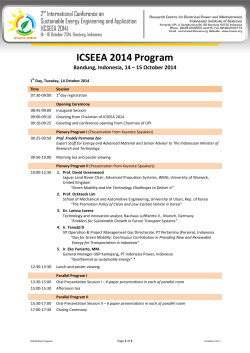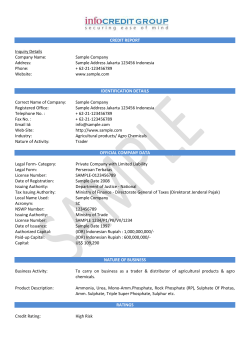
Jokowi`s Vessel Sinking Policy: A Question of Propriety
No. 026 – 10 February 2015 www.rsis.edu.sg RSIS Commentary is a platform to provide timely and, where appropriate, policy-relevant commentary and analysis of topical issues and contemporary developments. The views of the authors are their own and do not represent the official position of the S. Rajaratnam School of International Studies, NTU. These commentaries may be reproduced electronically or in print with prior permission from RSIS and due recognition to the author(s) and RSIS. Please email: RSISPublications@ntu.edu.sg for feedback to the Editor RSIS Commentaries, Mr Yang Razali Kassim. Jokowi’s Vessel Sinking Policy: A Question of Propriety By Jonathan Chen and Emirza Adi Syailendra Synopsis Jokowi’s policy of sinking vessels that fish illegally in Indonesian waters as well as his unyielding approach towards drug convicts has drawn regional concern and consternation. Commentary A HUNDRED days into his presidency, the Joko Widodo (Jokowi) Administration’s no-nonsense approach towards illegal fishing within its waters as well as its uncompromising stance on drug trafficking had sparked strong reactions and debates outside Indonesia. The deliberate orchestration of a highly public sinking of three empty Vietnamese vessels last December was unflatteringly portrayed as “shock therapy”. At the same time, not granting clemency for drug convicts currently on death row ruffled a few feathers. It also led to the recall of the Brazilian and Dutch ambassadors from their diplomatic posts. Two of the “Bali Nine” convicts from Australia are also slated to face the death penalty. A legal issue In these decisions, President Jokowi had shown himself to be an unflinching and determined leader despite mounting outside pressure. However it had also led to spirited debates on the audacity and harsh treatment that appeared to be a sharp departure from former president Yudhoyono’s more laissez-faire attitude. Reeling from the apparent shock value from an Indonesia that once espoused a policy of a “thousand friends and zero enemies”, the legality and propriety aspects of these brazen acts of the new government have been called into question. Based on Article 69, Paragraph 4 of Law No. 45/2009 on Fisheries, Indonesian authorities exercised their right to burn or sink foreign fishing vessels that have been fishing illegally within Indonesian territorial waters. Referred to as the “Indonesian fishing management area”, this is understood as comprising Indonesian waters (both internal waters and the territorial seas) as well as the exclusive economic zones (EEZ) of Indonesia. Undoubtedly, recent actions taken by Indonesia to blow up trespassing vessels were well within the praxis of Indonesian domestic law. On the other hand, Paragraph 114 of Law No. 35/2009 on Narcotics stipulates that drug couriers trafficking up to one kilogram or more is seen as a serious offence and will be liable for death penalty by firing squad. Offenders currently on death row have clearly exceeded the stipulated amount leaving little recourse for leniency. The Bali Nine incident in particular saw the attempted smuggling of 8.3 kg of heroin out of Indonesia. While an unofficial moratorium on executions were granted temporarily from 2008 to 2013 under the Yudhoyono Administration, this did not mean that ultimate reprieve was achieved. Yudhoyono did not institute a blanket clemency for the drug traffickers when leaving office in 2014, leaving the potentially contentious issue in the hands of his successor. A matter of propriety? Admittedly, actions taken under the Widodo Administration have not been received with much fanfare. The sinking of vessels policy, some have asserted, was incompatible with Indonesia’s reputation as leader of ASEAN and undermines good neighbourly relations. There were concerns that Indonesia’s new preoccupation with territorial integrity along its maritime borders would raise alarming memories of an Indonesia during the staunchly anti-colonial Sukarno era. While these assertions are seen as more hyperbole than reality, the highly publicised sinking event is a deterrent to opportunistic illegal vessels attempting a run in the expansive waters under the jurisdiction of archipelagic Indonesia. In furthering Indonesia’s international standing, the country under Yudhoyono enjoyed an unprecedented period of amnesty. However the same could not be said of current president Jokowi whose interests have been perceptibly more domestic with a tinge of nationalism. While Jokowi’s uncompromising stance on the drug penalty may affect bilateral relations with affected nations in the short run, it is not likely to be a stumbling block for cooperation in the long run. On this issue, it can be ascertained that Jokowi is merely following convention. A false expectation Disappointments with the actions of the Widodo Administration so far rest on the premise of Jokowi as a reformist president. Instead of quibbling over the legal or propriety basis of his tough actions it is perhaps more prudent that attention be directed to the ultimate aims of Jokowi’s Working Cabinet (Kabinet Kerja). A strong underlying motivation is Jokowi’s identification and peculiar interpretation of the Sukarnoist principle of Trisakti, seen as a major component driving his policies. While its tenets are decidedly abstract, priority of Indonesia’s foreign relations has clearly shifted away from the equally nebulous ‘dynamic equilibrium’ approach that had characterised the Yudhoyono cabinet. While not overtly nationalistic, Trisakti demands that Indonesia pays special attention to issues of national pride and honour that inevitably revolves around the idea of sovereignty (kedaulatan). This amalgamation ties in with Jokowi’s Sanskrit pledge of “Jalesveva Jayamahe” (in the sea we are victorious) and the reification of the concept of a ‘global maritime fulcrum’. Years of unnoticed trespassing and unpublicised illegal fishing will have to make way for a pronounced enforcement of its maritime borders. Although blowing up illegal, unreported or unregulated (IUU) vessels is a conventional practice undertaken even by other countries in the region, the decision to highlight the event with full publicity speaks volumes of the serious intent by the administration of combating this perennial scourge. If Jokowi’s calls for ‘mental revolution’ are any indirect indication, the same rationale applies to his stance on capital punishment. A total of 66 prisoners out of 129 currently on death row are drug convicts. Furthermore in a ruling of 2007, the Indonesian Constitutional Court rejected the claim that capital punishment violated the Constitution. While it has been an issue long swept under the carpet by the Yudhoyono presidency, it is clear that Jokowi relies on convention and consistency rather than a veiled amnesty, with the primary aim of ‘enforcing the law’ (penegakkan hukum) – yet another tenet of Trisakti. Domestically, these decisions were well-received by Indonesians themselves. It may be conjectural to view Jokowi’s decisions as an opportunistic attempt to rally domestic support in order to assuage suspicions of being indecisive and soft. Although Jokowi’s action has the backing of local legitimacy, its motive as a form of popularity incentive remains weak. Issues of maritime sovereignty and law enforcement remain non-negotiable precisely because it is the raison d'etre of Jokowi’s ‘Working Cabinet’. Jonathan Chen and Emirza Syailendra are respectively Associate Research Fellow and Research Analyst at the Indonesia Programme of the S. Rajaratnam of International Studies (RSIS), Nanyang Technological University. Nanyang Technological University Block S4, Level B4, 50 Nanyang Avenue, Singapore 639798 Tel: +65 6790 6982 | Fax: +65 6794 0617 | www.rsis.edu.sg
© Copyright 2025










